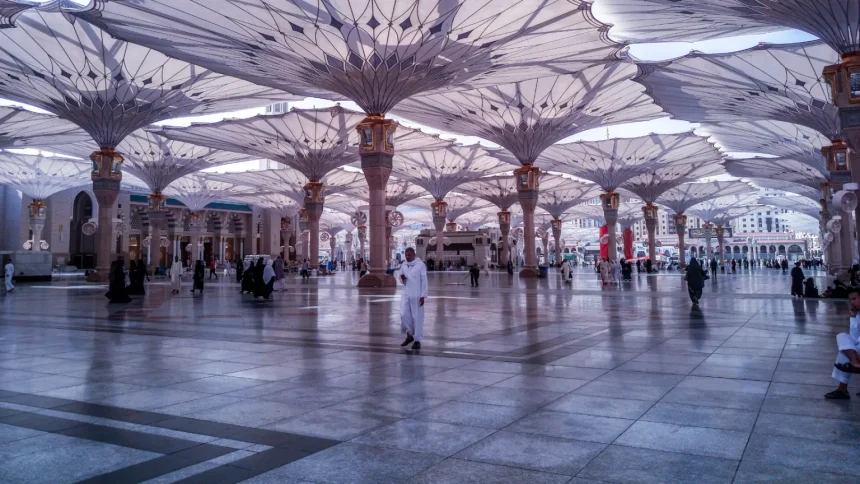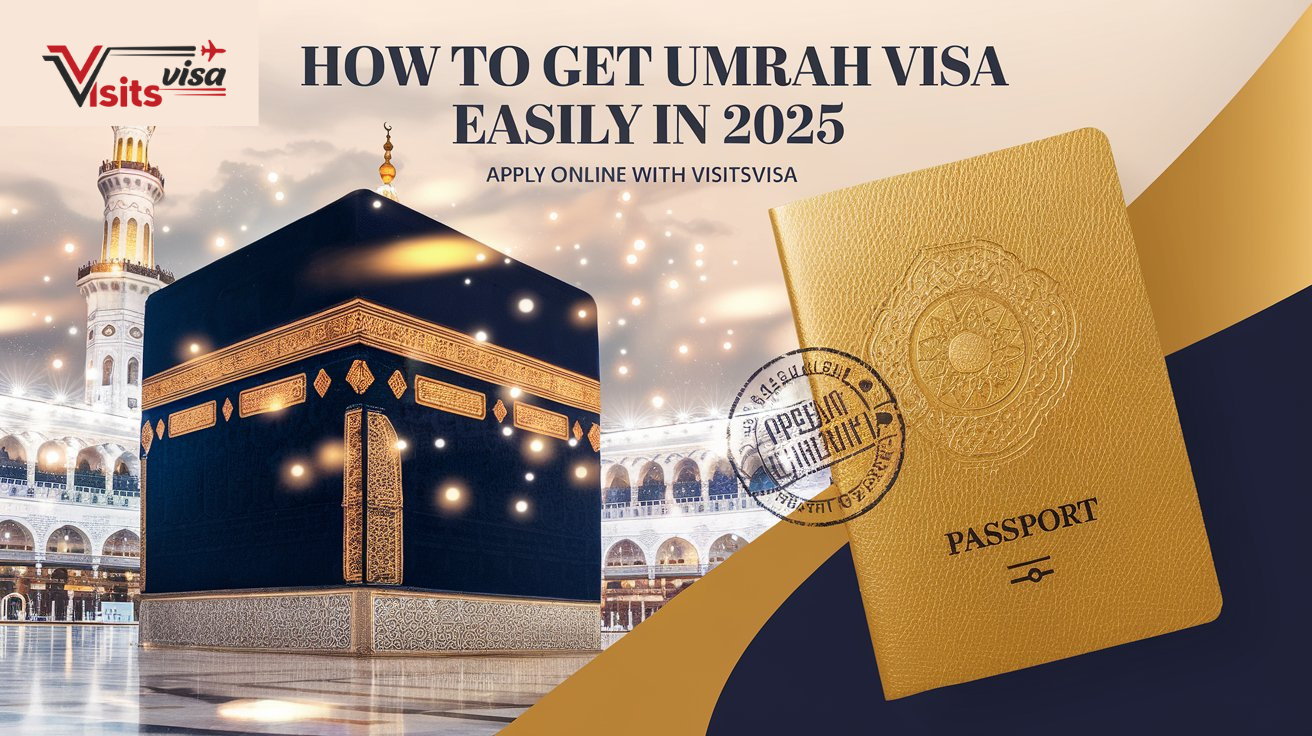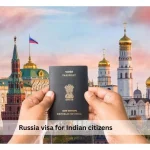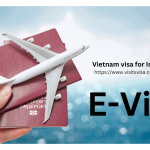Every year, millions of Muslims from all over the world go to Mecca in Saudi Arabia for Umrah, a special trip. Umrah is a way to show love, devotion, and thanks to Allah. It’s a big part of Islam, and you can do it any time of the year.
If you want to know more about Umrah, keep reading. You’ll learn all about how to do Umrah in Saudi Arabia and its history. You’ll also find out what you need to travel to Saudi Arabia and some helpful tips.
You’ll also learn about visa requirements to travel to Saudi Arabia, as well as some practical tips.
What is Umrah?
Umrah means “visiting a crowded place” in Arabic. It’s a special trip for Muslims to the holy city of Mecca. While Umrah isn’t mandatory, it’s still very important to Muslims.
Most people do Umrah visa during Ramadan or the two months before it, called Rajab and Sha’ban. Muslims believe these times are extra special for prayers and worship.
Anyone, no matter their age, can do Umrah. There’s no limit to how many times you can do it in your life. But if a woman is under 45, she needs to go with a male relative who is over 17. Women over 45 can go in tour groups without a male relative.
A spiritual journey of faith
The first pilgrimage or Umrah was the initial journey that the Islamic prophet Muhammad and his followers made after moving to Medina.
Umrah is a trip to the holiest place in Islam, the Kaaba (House of God) in Mecca. People of all backgrounds, from different ethnicities, social classes, and cultures, can go on this spiritual journey. It’s all about showing devotion to Allah.
No matter where Muslims are, they turn towards the Kaaba when they pray their five daily prayers.
Difference between Umrah and Hajj
The Hajj is a huge yearly event, drawing over two million pilgrims from about 188 countries. It’s estimated that several million more people do Umrah each year, probably because it’s cheaper and quicker.
Unlike the Hajj, Umrah only takes a few hours and can be done any time of year. The Hajj can only be done between the 8th and 13th of Dhul Hijah, the last month of the Islamic lunar calendar.
While Umrah is optional, Hajj is mandatory for those who can afford it and are physically able. Muslims who can should do Hajj at least once in their lives since it’s one of the five pillars of Islam.
The importance and benefits of Umrah
Umrah, an Islamic pilgrimage to the holy city of Mecca, holds immense significance in the hearts of Muslims around the world. It is a sacred journey undertaken by millions of believers each year, characterized by profound spiritual experiences and personal transformation. In this article, we explore the importance and numerous benefits of performing Umrah, shedding light on its spiritual, communal, and personal dimensions.
Umrah rituals and practices
Umrah, a sacred pilgrimage in Islam, involves a series of rituals and practices that hold profound spiritual significance for Muslims. These rituals are steeped in tradition and are performed with the utmost devotion and reverence. In this section, we delve into the key rituals and practices associated with Umrah, outlining the journey that pilgrims undertake in their quest for spiritual fulfillment.
1. Ihram: Entering the State of Consecration
The journey of Umrah commences with the pilgrim entering the state of Ihram. Ihram is a state of ritual consecration marked by the donning of simple white garments for men and modest attire for women. By wearing Ihram, pilgrims symbolize their readiness to embark on a spiritual journey and their detachment from worldly distractions. The act of entering Ihram is accompanied by the recitation of specific prayers and intentions, reinforcing the pilgrim’s commitment to fulfilling the rites of Umrah with sincerity and devotion.
2. Tawaf: Circumambulation Around the Kaaba
One of the central rituals of Umrah is Tawaf, which involves circumambulating the Kaaba, the sacred house of Allah located in the Masjid al-Haram in Mecca. Pilgrims perform seven circuits of Tawaf around the Kaaba in a counter-clockwise direction, expressing their reverence and devotion to the Creator. During Tawaf, pilgrims recite prayers and supplications, beseeching Allah for forgiveness and blessings. Tawaf symbolizes the unity of the Muslim Ummah and the centrality of Mecca in Islamic faith, as believers from all corners of the world converge upon the holy city to perform this sacred ritual.
3. Sa’i: Walking Between Safa and Marwah
Following Tawaf, pilgrims proceed to perform Sa’i, which involves walking between the hills of Safa and Marwah seven times. This ritual commemorates the actions of Hajar, the wife of Prophet Ibrahim, who traversed the same path in search of water for her son Isma’il. Sa’i symbolizes perseverance and trust in the divine providence of Allah, as pilgrims reenact Hajar’s journey while supplicating for guidance and blessings. The act of walking between Safa and Marwah serves as a reminder of the importance of steadfastness and faith in the face of adversity, reinforcing the pilgrim’s resolve to seek closeness to Allah through acts of devotion and obedience.
4. Tahalul: Exiting the State of Ihram
Upon completing the rituals of Umrah, pilgrims exit the state of Ihram through a process known as Tahalul. This involves the performance of specific rites, including the cutting or shaving of hair, which symbolizes the pilgrim’s transition back to a state of normalcy. By exiting Ihram, pilgrims signify the conclusion of their pilgrimage and the fulfillment of their religious obligations. Tahalul is accompanied by expressions of gratitude and joy, as pilgrims rejoice in the spiritual blessings bestowed upon them during their journey.
Umrah duas and supplications
Allah has given humanity the gift of dua, an incredibly personal means of connecting and communicating with Him.
A dua is an act of supplication, meaning to ask or beg for something with humility or earnestness. Muslim worship involves asking Allah for forgiveness, mercy, favors, and answers to prayers.
It is not necessary to recite verses specific to performing Umrah. There are however duas that the Prophet Muhammad prayed at various points, and other recommended duas to recite while performing Umrah:
- Dua for traveling
- Dua for the first sight on Kabba
- Dua for entering Haram
- Dua before entering in ihram
- Dua for ihram
- Dua for Tawaaf and after completing Tawaaf
- Dua while drinking Zamzam
- Dua for Sa’ii
- Dua while leaving the Masjid-al-Haram
How to prepare for Umrah
Before embarking on the journey of Umrah visa apply online, it is essential to educate yourself about the rituals, practices, and requirements associated with the pilgrimage. Seek guidance from knowledgeable sources, such as religious scholars, books, or reputable online resources, to gain a thorough understanding of what to expect during Umrah. Familiarize yourself with the steps involved in performing Umrah, including Ihram, Tawaf, Sa’i, and Tahalul, as well as any specific supplications or prayers associated with each ritual.
2. Make Necessary Travel Arrangements
Once you have a clear understanding of the pilgrimage, make the necessary travel arrangements for your journey to Mecca. This includes booking flights, accommodation, and transportation in advance to ensure a hassle-free experience upon arrival. Consider choosing accommodations that are close to the Masjid al-Haram, where the Kaaba is located, to minimize travel time and maximize your time for worship and reflection.
3. Obtain Necessary Documentation
Ensure that you have all the necessary documentation required for travel to Saudi Arabia and participation in Umrah. This includes a valid passport with at least six months validity, a visa for entry into the country, and any other relevant permits or certificates. Be sure to check the requirements of the Saudi authorities and comply with all regulations to avoid any complications or delays during your journey.
4. Pack Essentials for the Journey
Pack carefully and thoughtfully for your journey to Mecca, taking into account the climate, duration of your stay, and the nature of the pilgrimage. Essentials items to pack include comfortable and modest clothing suitable for the warm weather, as well as personal hygiene products, medications, and any religious items or materials you may require. Remember to pack light, as you will be required to carry your belongings with you during the rituals of Umrah.
5. Prepare Mentally and Spiritually
Preparing for Umrah is not just about making logistical arrangements; it also involves preparing mentally and spiritually for the journey ahead. Take time to engage in spiritual practices such as prayer, meditation, and recitation of the Quran to strengthen your connection with Allah and purify your intentions for performing Umrah. Reflect on the significance of the pilgrimage and the opportunity it presents for spiritual growth and renewal.
6. Seek Guidance from Scholars and Mentors
Seek guidance and advice from knowledgeable scholars and mentors who can offer spiritual guidance and support throughout your journey. Attend pre-Umrah seminars or workshops conducted by reputable religious organizations to gain insights into the rituals and practices of Umrah and to seek answers to any questions or concerns you may have. Surround yourself with pious companions who can offer encouragement and support as you embark on this sacred journey.
The cost of Umrah
The cost of Umrah, the sacred pilgrimage to Mecca, varies depending on a variety of factors, including travel arrangements, accommodation choices, and personal preferences. While Umrah is often considered more affordable than Hajj, the annual pilgrimage to Mecca, it still requires careful financial planning and budgeting to ensure a smooth and financially feasible journey. In this guide, we break down the expenses associated with Umrah and offer practical tips for budgeting and managing costs effectively.
1. Travel Costs
One of the primary expenses of Umrah is travel costs, including flights to and from Mecca, transportation within Saudi Arabia, and any additional travel expenses incurred during the journey. The cost of flights can vary depending on factors such as the time of booking, airline preferences, and departure city. It is advisable to book flights well in advance to secure the best deals and minimize expenses.
2. Visa and Documentation
Pilgrims traveling to Mecca for Umrah are required to obtain a visa from the Saudi authorities, which may incur additional costs. In addition to the visa fee, pilgrims may also need to cover the cost of other documentation, such as passport renewal or travel insurance. Be sure to factor in these expenses when budgeting for your Umrah journey.
3. Accommodation
Accommodation is another significant expense associated with Umrah, as pilgrims are required to stay in Mecca for the duration of their pilgrimage. The cost of accommodation can vary depending on factors such as location, proximity to the Masjid al-Haram, and the level of comfort and amenities provided. Consider options such as hotels, guesthouses, or apartment rentals, keeping in mind your budget and preferences.
4. Food and Beverages
While in Mecca, pilgrims will need to cover the cost of food and beverages for the duration of their stay. This includes meals at restaurants, snacks, and drinks purchased during the pilgrimage. To manage expenses, consider opting for budget-friendly dining options or preparing your meals if possible. Be mindful of the dietary restrictions and preferences of fellow pilgrims when selecting dining options.
5. Miscellaneous Expenses
In addition to the main expenses outlined above, there may be various miscellaneous expenses associated with Umrah, such as transportation to and from the airport, souvenirs, and personal purchases. It is essential to budget for these additional expenses and allocate funds accordingly to avoid any financial strain during your pilgrimage.
Shopping in Makkah and Madinah
After Mecca, Medina is the second most crucial holiday city. Making specific informational purchases for Umrah’s performance is mandatory.
- Men perfume their heads and beards. Women don’t perfume themselves.
- Men should wear a habit composed of two seamless white fabrics rolled around the body, exposing the right shoulder. Do not cover your head or face.
Many pilgrims bring home some souvenirs as a reminder of their incredible journey to Umrah.
Budgeting Tips for Umrah
To effectively manage the cost of Umrah and ensure a financially feasible journey, consider the following budgeting tips:
- Start saving early and set aside a dedicated fund for your Umrah pilgrimage.
- Research and compare prices for flights, accommodation, and other expenses to find the best deals.
- Create a detailed budget outlining all anticipated expenses and allocate funds accordingly.
- Look for ways to reduce costs, such as opting for budget-friendly accommodation or dining options.
- Consider traveling during off-peak times to take advantage of lower prices and avoid crowds.
Apply for the Saudi Arabia Tourist eVisa
The Saudi Arabia Tourist eVisa is an electronic visa that grants multiple entries and allows tourists to stay in Saudi Arabia for up to 90 days in total. It is suitable for various tourism-related activities such as attending events, visiting family, leisure travel, and participating in Umrah (excluding Hajj).
For Muslim travelers who wish to perform Umrah but do not have a Muslim name, it is recommended to carry a certificate from a mosque or Islamic center to confirm their religious beliefs. Non-Muslims are also eligible to apply for the Saudi Tourist eVisa, but they are not permitted to undertake Umrah.”
More questions about traveling to Saudi Arabia?
Please chatting to our excellent customer service team online or via email and our website visitsvisa







